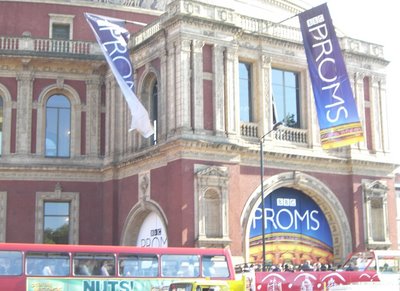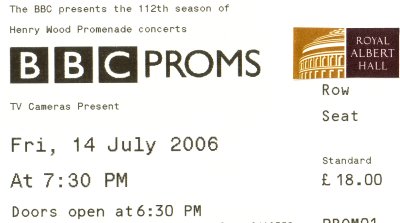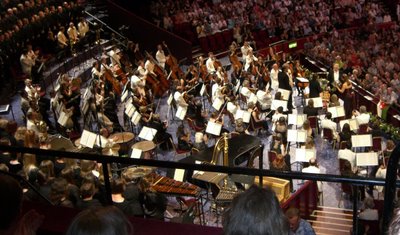BBC Proms - summer in the city

Hot town, summer in the city
Back of my neck getting dirty and gritty
Been down, isn't it a pity
Doesn't seem to be a shadow in the city
All around, people looking half dead
Walking on the sidewalk, hotter than a match head
Lyrics from Lovin' Spoonful's 1966 song Summer in the City

On Friday, as my photos show, there didn't seem to be a shadow in the city as a sweltering London launched into the 112th season of the Henry Wood Promenade Concerts. The concerts are in the Royal Albert Hall, which is located west of the city centre in the university and museum district. The hall is located between two major roads out of London, and the traffic and parking are horrendous. The Albert Hall was opened by Queen Victoria in 1871, but only became the Proms venue in 1941 when the more central, and acoustically far superior, Queen's Hall was destroyed by German bombs. Unique is the only word to describe the Albert Hall; the Grade 1 listed building is oval in shape, and is topped by a huge glass and iron dome. In my photo below you can see the great terra cotta frieze, depicting "The Triumph of Arts and Sciences", that runs around the top of the building.
 The capacity of the hall is more than 5000, which is a very large audience by classical standards. Last season more than 250,000 tickets were sold for the Proms, and an average capacity of more than 80% was achieved with 20 concerts sold out. The Proms take their name from the 900 standing room tickets sold for the Promenade in front of the orchestra (you can see the front rows of the promenaders in my last photo below), and for the 'gods' at the top of the auditorium. Ticket prices for the most expensive concerts range from £27 ($49) for a seat in a box to £5 ($9) for standing. My excellent choir seat for the opening night, from which the last photo below was taken during the applause, cost £18 ($32). For obvious reasons there are no reservations in the promenade (although season tickets are available for £160 [$290]) , and the promenaders queue for hours outside the hall for their places. My photo above shows the good natured, but very hot, queue for Friday's First Night.
The capacity of the hall is more than 5000, which is a very large audience by classical standards. Last season more than 250,000 tickets were sold for the Proms, and an average capacity of more than 80% was achieved with 20 concerts sold out. The Proms take their name from the 900 standing room tickets sold for the Promenade in front of the orchestra (you can see the front rows of the promenaders in my last photo below), and for the 'gods' at the top of the auditorium. Ticket prices for the most expensive concerts range from £27 ($49) for a seat in a box to £5 ($9) for standing. My excellent choir seat for the opening night, from which the last photo below was taken during the applause, cost £18 ($32). For obvious reasons there are no reservations in the promenade (although season tickets are available for £160 [$290]) , and the promenaders queue for hours outside the hall for their places. My photo above shows the good natured, but very hot, queue for Friday's First Night.A little background to the concerts is useful here. They were founded by the eminent conductor Sir Henry Wood in 1895. The BBC has been involved since 1927 but did not take full control of the concerts until 1942, and although more than half a century has passed since then the BBC's remorseless branding and media promotion of the series is still sometimes difficult to accept. For many years the programming of the concerts followed a particular pattern according to the day of the week. The very first concert conducted by Sir Henry Wood started with the Rienzi Overture, and Monday was traditionally Wagner night. By contrast in the 2006 season Wagner receives just four performances, one more than John Adams, although in fairness one of those is a complete Siegfried .
Wood also bravely introduced British audiences to many noteworthy European composers, especially Sibelius and composers of the Russian school. In 1912 he conducted Schoenberg’s Five Orchestral Pieces. His words to the orchestra at that time were: “Stick to it, gentlemen, this is nothing to what you’ll have to play in 25 years’ time”. That advice from seventy-five years ago is curiously at variance with the 2006 Prom director Nicholas Kenyon's stated policy of 'taking the audience with us', particularly as the 2006 season contains not a single note of Schoenberg's music.

Although my ticket above warns in very small print 'TV Cameras Present' the presence of BBC TV and radio broadcasting equipment at the concerts is no small matter. My photo below shows just a small part of the outside broadcast circus that will be camped outside the hall until September. In recent years the Proms have moved from being a concert series with media coverage to a media event with an audience present. There are an awful lot of cameras and microphones present, and cameras roam freely on stage during the performance with a boom mounted camera sweeping backwards and forwards over the players. The start of the concert is controlled by the spoken introduction from talking heads who are visible to the audience doing their stuff in one of the loggia boxes. Although the technology baggage is not a deal breaker the heat generated by the mass of TV lights and equipment can be.
I will show my age by saying that I was there in the audience in 1974 when the heat from the TV lights caused the baritone Thomas Allen to faint during his big solo, "Estuans interius" in Carl Orff's Carmina Burana, and his place was taken by a music student from the promenade. In the thirty-odd years since than the ventilation in the hall hasn't improved, and the temperatures on Friday were well into faint-inducing levels. In fact the start of the concert was delayed by a few minutes due to the illness of one of the brass players, although I don't know whether or not this was heat related.
With more than 5000 people in the audience, with all the brouhaha of TV cameras, and some extreme temperatures, the atmosphere often resembles a rock concert. This is probably a good thing as the electric atmosphere covers the troublesome acoustics of the cavernous circular hall. There have been several partially successful attemps to tame the reverberation using a canopy over the stage and 'flying saucers' up in the dome. But the simple fact is that apart from the Proms the Albert Hall is hardly used for serious classical concerts because of its problematic acoustics and layout. The sound is at its best in the meatier repertoire, and on Friday it was more than acceptable in the Dvorák Te Deum and Shostakovich Fifth Symphony. But it lacked any intimacy in the Mozart arias, which is not really surprising given the sheer size of the auditorium.

Which neatly brings me on Friday's First Night which the BBC Symphony's new Chief Conductor Jiří Bělohlávek conducting Dvorák's Te Deum, Shostakovich's Fifth Symphony, plus Vltava from Smetana's Má Vlast and Mozart's Marriage of Figaro Overture and two Mozart arias. I'll leave the reviewing to the qualified critics, and just say that although it was a very fine concert the conductor, orchestra and audience still seemed to be getting to know each other in the first half. After the interval the Shostakovich symphony was a blast. But that was probably due to the composer as much as the conductor, particularly in the Allegro non troppo finale. Shostakovich Five and Mahler One, with their superbly orchestrated finales, are two symphonies that I cannot recall too many bad performances of. But that shouldn't detract from the fine contribution from the BBC Symphony and Jiří Bělohlávek, plus of course the soloists and BBC Singers. It is very good news that this partnership of conductor and orchestra promises so much after the frustratingly fallow years with Leonard Slatkin at the helm.

The BBC Promenade concerts are a bizarre mix of hi-tech media, and low technology venue. So, in conclusion, let's celebrate that unique mix by revisiting a poem written in 1945, by the then Poet Laureate John Masefield, which celebrated both the Jubilee Year of the concerts, and Sir Henry Wood's seventy-fifth birthday. The words are from an age, and culture, that soon disappeared as London was rebuilt after the War. But how may music festival founders have had a poem written in their honour? And most importantly, among all the doggerel, there is a blinding truth that applies just as much the Proms today as it did in 1945 - In the dry desert giving living dew.
To Sir Henry Wood
How many thousand times have you upheld
A batonette between two multitudes,
Each hushed to ready and receptive moods,
Waiting your mind's impulsion, that will bring
Oneness to beat, to breath and and stroken string,
And beauty's presence, holding the house spelled?
Ah, many times to me, as to the race,
You will have compelled this ecstasy of law
Lifting the human pattern from its flaw,
In the dry desert giving living dew.
Lord of sweet Music and of Langham Place,
Today, this nation thanks and praises you.
* Watch the First Night of the Proms via BBC video on demand until 21st July via this link
* On An Overgrown Path carries a weekly Proms preview
All photos taken by Pliable on July 14th 2006 using a Casio EX-Z120 digital camera, and copyright On an Overgrown Path. Report broken links, missing images and other errors to - overgrownpath at hotmail dot co dot uk
If you enjoyed this post take An Overgrown Path to I am a camera - Leipzig








Comments
On Friday it was the bustle of London and the bombast of Shostakovich.
On Saturday it was the serenity of The Old Granary Studio deep in rural norfolk. Norfolk's leading piano technician Andrew Giller
and his wife Jill have converted the granary adjacent to their farmhouse into a perfect venue for chamber music and recording.
Mark Ashford (guitar) and David Pollock (harpsichord) played a wonderful programme that ended with a spellbinding transcription of Rodrigo's Fantasia para un Gentilhomme for guitar and harpsichord.
But the most magical moment of the evening was Mark Ashford playing Bach's Prelude in G, BWV 902 - that is the one Bach considered too good to 'waste' in the Well Tempered Clavier.
It truly fulfilled John Masefield's words above ...
Lifting the human pattern from its flaw